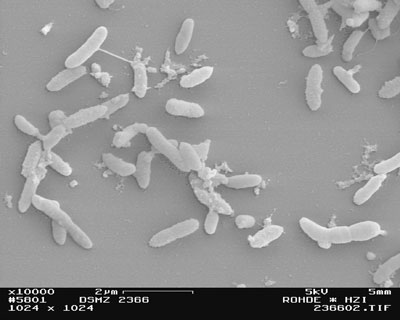 |
||||||
March 2011Geneva genome update
In the spring of 2010, Geneva College became one of 20 schools in the United States selected to join the Undergraduate Microbial Genome Annotation Program, an initiative of the Department of Energy′s Joint Genome Institute (JGI) that offers colleges and universities the opportunity to “interpret” bacterial and archeal genomes. The hope of the initiative is that new biotechnology applications may be discovered that could help move the world away from dependence on fossil fuels. The program provides participants recently sequenced genomes which are all relatively unusual and have not yet been subjected to long-term study, so a high potential exists for making new and exciting discoveries. Geneva adopted Pedobacter heparinus, a bacterium found in dry soil. Pedobacter bacteria have the ability to metabolize heparin, a complex sugar that inhibits blood-clotting, for use as an energy source. Since last year, about 35 Geneva students have been involved in researching Pedobacter bacteria with the primary focus of deciphering the genes that enable the bacteria to move around in its environment. Annotating a genome is a complex process that involves identifying the elements of a genome, called gene predicting, and then attaching information to these elements. Gene predicting is accomplished using specialized computer software named Glimmer (Gene Locator and Interpolated Markov ModelER). Glimmer is used first to find and predict genes in microbial DNA. These predictions must then be subjected to a more rigorous human analysis and tested in order to confirm their accuracy. At this point, students become involved in the process. The DNA of Pedobacter bacteria, for example, has 4.5 million individual characters that comprise 4,500 genes. The result is that there are 4,500 hypotheses to test in annotating the Pedobacter genome. Students conduct experiments and run software programs to test the validity of the data generated by Glimmer. “The research really tests the ability of students to understand biology well enough to make a decision,” explains biology professor and head of the genomics project at Geneva Dr. David Essig. “There is tremendous educational value in this student-centered discovery-based learning.” So far, student research at Geneva has revealed that Pedobacter bacteria use “gliding” as a method of locomotion across semi-solid surfaces. While gliding, the bacteria increase their rate of cell division, allowing the Pedobacter bacteria to more effectively colonize new areas in order to ensure survival. The bacteria also have the ability to sense the presence of other bacteria and will “glide” away from competitors. By participating in the Undergraduate Microbial Genome Annotation Program, Geneva offers undergraduate students exceptional opportunities for both educational and professional growth. “The students and I have discovered a lot so far,” says Dr. Essig. “Several students who worked with me had sufficient data to submit abstracts to this year′s Western PA Undergraduate Biology Symposium.” This semester, about 50 freshman students have also been brought into the project, using laptops to complete preliminary characterization of one gene each. This method enables students to learn and master methods of analysis by conducting research whenever and wherever they have the opportunity–including their dorm rooms. According to Dr. Essig, “The most exciting thing about the work is how it makes the students think. The work forces students to raise more questions than answers, but also leads to testable hypotheses.” By integrating the genome annotation program into the curriculum at Geneva, students benefit from traditional course work enhanced with inquiry-based instruction. And the project advances the integration of faith and learning that is integral to a Geneva College education. “We don′t just talk about how the bacteria functions, we do growth experiments to see motility for ourselves,” says senior biology major Julie Holland. “We don′t just learn about genes, we use experimentation to study them on the computer and in the lab. Through the project, I′m gaining a better understanding of genomics and, most importantly, a greater understanding of God′s creation.” |
|
|||||
 |
||||||






 Colloquia Series with Dr. Roberts
Colloquia Series with Dr. Roberts Students spend spring break helping out in Aliquippa
Students spend spring break helping out in Aliquippa Mancini Awards
Mancini Awards